The Job Layout Pane (Jobs Window)
This pane displays thumbnails of the Run List pages of the selected job. Status icons, corner folds, and colored backgrounds provide additional information about the current status and orientation of each of the displayed thumbnails.
TIP: To improve the speed with which job results are displayed, you can disable thumbnail viewing from the View menu.
You can double-click any of the thumbnails to launch the appropriate viewer for this specific page (Acrobat for PDF documents or Raster Preview for TIFF files). If the job has not yet received all required pages, you will see only empty placeholders.
NOTE: If you are viewing a versioning job, the layout is considerably different (depending on the specific parameters of the input documents). For more information, refer to “Versioning Jobs in the Results Tab”.
Page and Flat Thumbnails
You need to enable thumbnails (View > Thumbnails) in order to view a miniature representation of your job pages in the Job Layout pane.
If no imposition has been specified for the selected job, you will see a series of pages. The current status of each page is indicated by its background color.
 | A thumbnail view of this page is either not available, or is currently being retrieved from the Apogee System (green background color). |
 | Page has been processed successfully (no background color). |
 | Page has been processed successfully, and is on hold pending approval (blue background color). |
 | Page has been processed with errors (red background color). |
 | Page is managed by the PlateMaker Client, and is ready to plate (purple background color). |
 | Page has been processed successfully, but has been rejected. |
 | Page has been discarded. |
 | An empty page in the Run List (white background with a cross). |
 | A blank page in the Run List (white background). |
If an imposition scheme has been specified, you will see a series of flats. As with pages, the status of each flat is indicated by its background color.
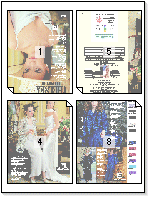 |
Extra Thumbnail Information
The following additional information is available for both pages and flats:
•Action indicator
•Separation indicator
•Proofing data indicator
•Raster data indicator
•Corner fold indicator
•Page number
•Flat label
•Signature
Action Indicator
Each individual page or flat may have one or more Action indicators above it (corresponding to hold points in the Production Plan). These may be any of the following:
 | The job’s Production Plan contains an After Hours Action. When this point is reached, the job results are held (written to disk) pending the specified time. | |
 | The job’s Production Plan contains a Soft Proof Action. When this point is reached, the job results are held (written to disk) pending approval/rejection of a Digital Film preview by the user. | |
 | The job’s Production Plan contains a Hard Copy Proof Action. When this point is reached, the job results are held (written to disk) pending approval/ rejection of a hard copy proof by the user. | |
 | The job’s Production Plan contains a Ready for Plating Action. When this point is reached, the job results are taken over and managed by PlateRunner (ready to plate). | |
 | The job’s Production Plan contains a Collect for Output Action. When this point is reached, the job results are held (written to disk) pending user intervention. | |
 | The job’s Production Plan contains a Waiting for Results Action. When this point is reached, the job results are held until the target flow or required pages are finished. | |
 | The job’s Production Plan contains a Discard Action. When this point is reached, the job results are held until the specified pages have been automatically discarded. | |
 | The job’s Production Plan contains a Web Proof Action. When this point is reached, the job results are held (written to disk) pending approval/rejection of a Digital Film preview by the remote user. | |
 | Result will be frozen once it has been approved by the remote user. | |
 | Result has been frozen because it has been approved by the remote user. |
These Action indicators can be in one of three states (as indicated below for the Soft Proof Action):
Action icon | Status |
|---|---|
 | The page or flat has not yet reached this Action. |
 | The page or flat has reached this Action (blue background). |
 | The page or flat has passed this Action (dimmed icon). |
When a flat is on hold, the entire flat is colored with a blue background in the Results tab, as illustrated below:
 |
When a page is on hold, only the page is colored with a blue background:
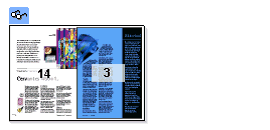 |
Any actions that have already been passed in the flow are grayed-out (dimmed), as follows:
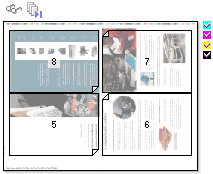 |
Separation Indicator
If a page or flat is made up of a series of separations, this is indicated by four (or more) small colored icons to the right. If you select the page or flat, the individual separations are displayed in the Separations pane (see “The Separations Pane (Jobs Window)”).
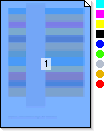 |
A square icon indicates that the separation is a process color; a round icon indicates that the separation is a spot color.
The separation indicators provide the following information for each of the colors.
 | Square outlined separation indicator: • A process color separation is expected (it has not yet been rendered). In this example, it is the magenta separation. • The background is available for an Apogee DQS job. | |
 | Square solid separation indicator: A process color separation has been rendered, and is ready for output. In this example, it is the magenta separation. | |
 | Checked separation indicator: The separation has been rendered, and has been successfully output. In this example, it is the magenta separation. | |
 | Dimmed separation indicator: The separation has been discarded, and will not be output. | |
 | Round outlined separation indicator: A spot color separation is expected (it has not yet been rendered). The outline color is the color of the expected spot color. | |
 | Round solid separation indicator: A spot color separation has been rendered, and is ready for output. The solid color is the spot color. | |
 | Checked separation indicator: The spot color separation has been rendered, and has been successfully output. |
For example, the page below contains 8 separations: the four CMYK process colors plus four spot colors. All these separations have been rendered (as indicated by the solid separation indicators) and have been successfully output (as indicated by the associated checkmarks):
 |
Proofing Data Indicator
Results may display a small, square multi-colored icon to their right. This is the Proofing Data indicator. It indicates that the page/flat belongs to a proofing workflow, and is a composite TIFF file (i.e., no separations).
 |
A checkmark indicates that the page/flat has been successfully output.
 | The page/flat belongs to a proofing workflow or a layout job, and is a composite file (i.e., not a separation). The page/flat has been rendered, and is ready for output. | |
 | The page/flat belongs to a proofing workflow or a layout job, and is a composite file (i.e., not a separation). The checkmark indicates that it has been successfully printed. |
Raster Data Indicator
For DQS and native Apogee DQS (Raster Impose) results, you can choose View > Show > Page Rendered. Results will then display a square gray-colored indicator in the lower right corner. This is the Raster Data indicator. It means that all separations in the page(s) have been fully rendered and are ready for previewing or output.
 |
Corner Fold Indicator
Small corner folds in a corner of each page indicate a page’s orientation.
 | The orientation of a page may vary in an imposition layout. The position of the corner fold tells you where the top of the page is. |
The orientation of a page may vary in an imposition layout. The position of the corner fold tells you where the top of the page is:
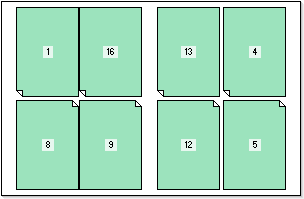 |
Page Number
Page numbers indicate the position of pages in the Run List. If you are viewing a flat, you will see the position of the pages on the flat.
Flat Label
Below each flat you will see a label, which indicates which side of the signature you are looking at. You can click this label to quickly select the entire flat. This is useful if pages cover the entire surface of the flat, making it difficult to select the flat (and not a page) by clicking directly on it.
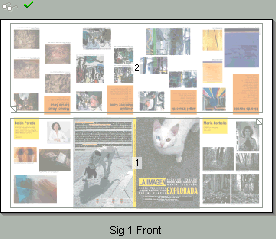 |
Signature
If Front and Back viewing has been enabled, you will see the complete signature for each page or flat in the job.
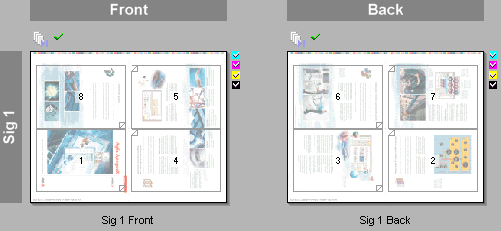 |
NOTE: In this example, the small checkmarks you can see indicates that all separations have been output.
doc. version 13.1.1